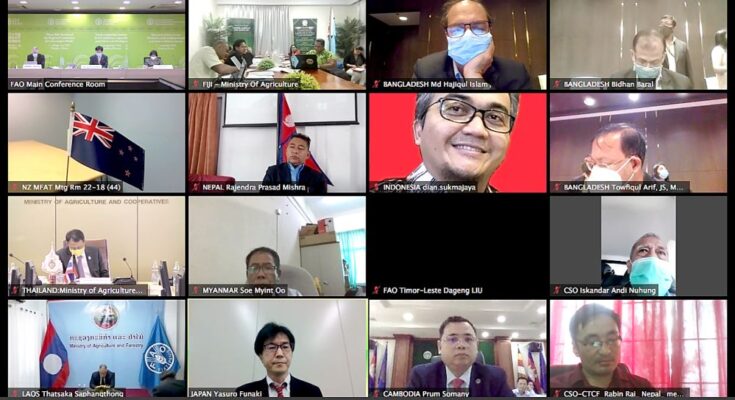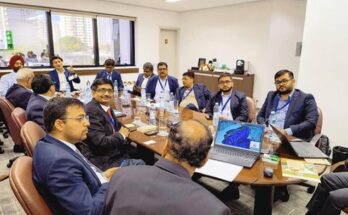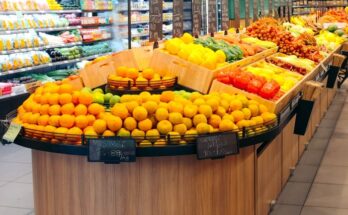Thimphu, Bhutan:- The FAO Regional Conference for Asia-Pacific, which started yesterday virtually hosted by Royal Government of Bhutan, has been an important platform for Food and Agriculture Organization of the United Nations (FAO) and the international community to hear and acknowledge the voice of those countries that are usually the most vulnerable to shocks, such as the impacts of COVID-19: Small Island Developing States (SIDS), Least Developed Countries (LDCs) and Landlocked Developing Countries (LLDCs).
Delegations from Pacific Islands actively participated in the first two days of technical discussions, showing their concerns about the challenges and impacts of the COVID-19 pandemic and other pressing issues.
The delegation of Tokelau, a non-self-governing territory of New Zealand and FAO Associate Member, mentioned that it has not yet experienced any case of COVID-19 in their population of just 1,400 people. However, its food security is under threat.
“I would like to congratulate the efforts being made by all countries, particularly countries in our Pacific community, for their efforts to combat COVID-19 and keeping Tokelau COVID-19 free. But with travel restrictions now in place, our food security will be greatly impacted. The dangers posed by COVID-19 are that a single mishap in our biosafety could prove very fatal to Tokelau’s long-term survival as a people,” the delegation said.
Tuvalu, another small island in the Pacific Ocean, has sought to implement internal measures to mitigate the impact of international trade disruptions: “Imported food supply is very much under threat. In the unprecedented outbreak of COVID-19, people have been encouraged to increase their activities in farming and fishing.”
The impacts of climate change have also been high on the agenda of the Pacific Islands during the FAO Regional Conference. The delegation of Samoa asked for international support to strengthen the resilience of their agrifood systems.
“We look forward to FAO to assist Samoa, especially with regards to the negative impacts of climate change, to ensure that our agriculture and fisheries resource management practices are in place; and that our climate resilience and risk mitigation measures are strengthened and enhanced.”
Samoa also noted another emergent threat: “African swine fever is slowly getting into the Pacific islands, and we acknowledge assistance with public awareness materials to help us inform our people on preventive measures.”
Both subjects – climate change and African swine fever – were also highlighted by the delegation of Papua New Guinea: “With respect to climate change, Papua New Guinea would like to support any initiatives to develop or promote suitable climate smart agriculture technologies between Asia-Pacific countries, through arrangements like South-South cooperation and mainstreaming women in agriculture processes”, the delegation said, noting that cross boundary biosecurity is of fundamental importance to tackle the advance of African swine fever and Fall Armyworm.
SIDS, LDCs and LLDCs: a FAO priority
Soon after the FAO Director-General, QU Dongyu, took office in August 2019, SIDS, LDCs and LLDCs were elevated to the highest priority in the Organization’s efforts to reduce hunger and boost agricultural potential in the world.
In this context, the FAO members approved a proposal of the Director-General to establish a dedicated office to exclusively address the challenges facing SIDS, LDCs and LLDCs, working as a catalyst of cross-sectoral coordination and foster development action.
SIDS, LDCs and LLDCs were also identified as the main focus of the Hand-in-Hand Initiative, launched by Director-General QU, which uses data and science-based analysis to determine where and how action can be targeted to have the greatest impacts on poverty and hunger.
During the Regional Conference, the delegation of Fiji thanked FAO for its “support in data collection and analysis” which has assisted the country to produce evidence-based decision making. “Our agricultural census earlier this year for the first time included forestry and fisheries sectors. It will also have for the first time disaggregated data on gender.”
Myanmar, a Least Developed Country, also praised the work of FAO to support the most vulnerable, particularly through the Hand-in-Hand Initiative: “Rapid assessment on the impact of COVID-19 gathered by FAO is very helpful for development of the Government’s plan. We believe that the Hand-in-Hand Initiative will open a new chapter, a new platform, and will provide an opportunity for our region. Myanmar supports this initiative and is ready to give its fullest cooperation,” the Myanmar delegation said.
FAO also intends to support SIDS, LDCs and LLDCs countries under the recently launched FAO COVID-19 Response and Recovery Programme, which aims to mitigate the immediate impacts of the COVID-19 pandemic while strengthening the longer-term resilience of food systems and livelihoods.
Bhutan, which is both a LDC and LLDC country, congratulated FAO and highlighted its decentralisation structure to support member countries: “We would like to applaud FAO for proactively engaging (over) the current COVID-19 pandemic situation and its impact on agriculture and food. Indeed the situation that we are passing through gives us a further realisation of the very important role of FAO offices in respective countries,” the Bhutan delegation said.
The FAO Regional Conference for Asia and the Pacific will continue until Friday 4 September.




